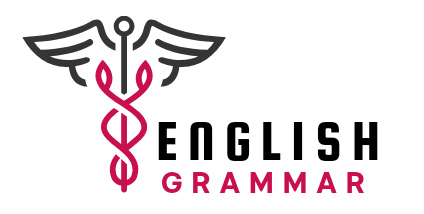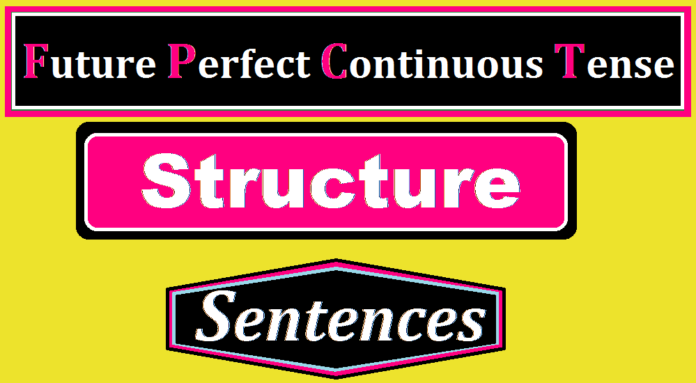Definition Structure of the Future Perfect Continuous Tense Formation of Sentences, using the helping verb (will have been/shall have been) in English grammar.
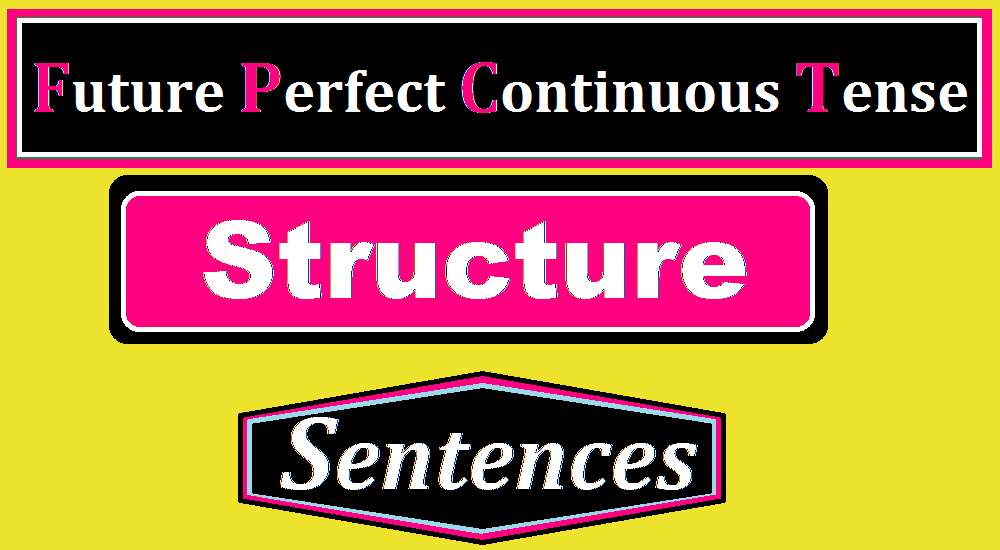
In this post, we will learn the structure of future perfect continuous tense with examples and how to make future perfect continuous sentences.
Definition of the Future Perfect Continuous Tense:
The Future Perfect Continuous Tense, also said as the future perfect progressive tense, is a grammatical verb form in English that describes the continuation of expected events at a specific place and time in the future.
What is The Future Perfect Continuous Tense?
Future perfect continuous tense is used to describe something that will occur at a specific point in the future. It highlights both the duration and the future conclusion of the ongoing action.
Will/Shall: A helping verb that tells us that the action is in the future.
Have: Another helping verb that combines with “been”.
Been: It tells us that the action is continuous or in progress.
Since: used to express a point in time in this tense, as (since morning, since evening, since night, since noon, since 1970).
For: used in this tense to express a period of time, as (for two hours, for five days, for two years, for three weeks).
For Example:
- He will have been reading this book for three hours.
- We will have been playing since morning.
In these examples, the sentences confirm that the actions continue for a period of time (for three hours) and a point of time (since morning).
The Full Structure Of Future Perfect Continuous Tense
In affirmative, interrogative, and negative sentences, the future perfect continuous tense is formed by using the first form of the verb with (ing) and the auxiliary verb (will have/shall have been).
Moreover, “since” and “for” are added to this tense to show the time of the period.
1. Assertive Sentence Structure of Future Perfect Continuous Tense
Future Perfect Continuous Tense Assertive sentences make positive statements that describe an action that will be continuing for a certain period of time in the future. These sentences are used to express the certainty of an action that will have been happening for a set duration.
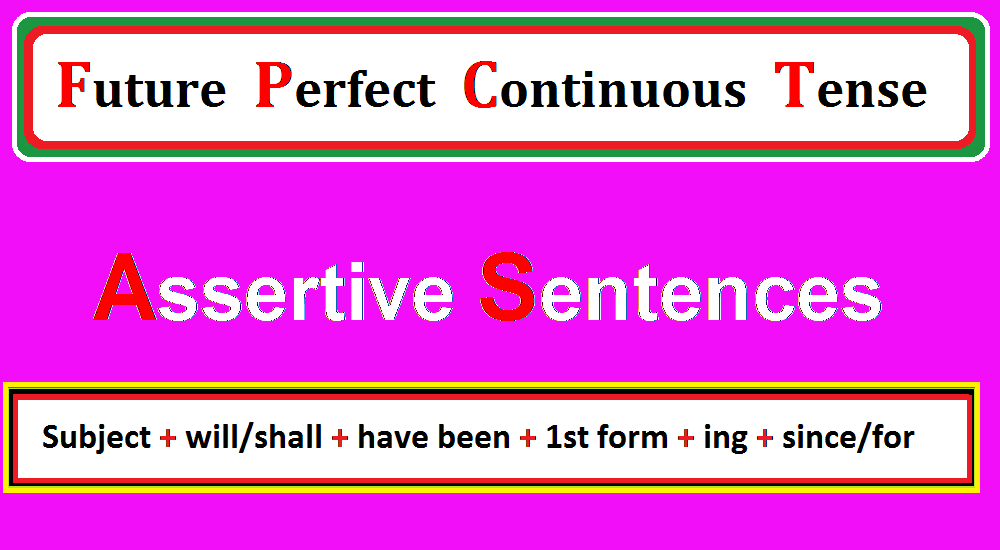
The future perfect continuous tense structure of an affirmative sentence is given.
Positive Formula of Future Perfect Continuous Tense:
The future perfect continuous tense formula for positive sentences is as follows.
Subject + (Helping Verb) will/shall have + been+ 1st form of verb + ing + Object + since/for
In the formation of affirmative sentences, understanding the affirmative formula of the future perfect continuous tense will help you make the right sentences.
Note Points:
There are some important points for creating an assertive sentence in the future perfect progressive tense;
- The “first form” of the verb is used with (ing) after the helping verb (will/shall have been).
- The auxiliary verbs (will have been /shall have been) are used after the subject in these sentences.
- “Shall have been” is used with pronouns (I, We), and “Will have been” is used with all singular plural nouns and pronouns.
- A full stop (.) is used at the end of a sentence to show a positive sentence in the future perfect continuous.
Assertive Sentences Examples of Future Perfect Continuous Tense:
To form future perfect continuous tense examples of affirmative sentences exercises are given below.
- I shall have been waiting for you for two days.
(Subject: I, Helping Verb: shall have, Add: been, Main verb: wait, Add: ing, Object: for you, Period of time: for two days)
- You will have been watching the match since 4 O, clock.
(Subject: You, Helping Verb: will have, Add: been, Main verb: watch, Add: ing, Object: the match, Point of time: since 4 O, clock)
- They will have been sleeping since noon.
(Subject: They, Helping Verb: will have, Add: been, Main verb: sleep, Add: ing, Point of time: since noon)
- It will have been raining cats and dogs since morning.
(Subject: It, Helping Verb: will have, Add: been, Main verb: rain, Add: ing, Object: cats and dogs, Point of time: since morning)
- We shall have been living in this house since 1990.
(Subject: We, Helping Verb: shall have, Add: been, Main verb: live, Add: ing, Object: in this house, Point of time: since 1990)
- The boys will have been making a noise for an hour.
(Subject: The boys, Helping Verb: will have, Add: been, Main verb: make, Add: ing, Object: a noise, Period of time: for an hour)
- She will have been washing the clothes for two hours.
(Subject: She, Helping Verb: will have, Add: been, Main verb: wash, Add: ing, Object: the clothes, Period of time: for two hours)
- I shall have been studying in this collage for three years.
(Subject: I, Helping Verb: shall have, Add: been, Main verb: study, Add: ing, Object: in this collage, Period of time: for three years)
- The doctor will have been treating the patient since night.
(Subject: The doctor, Helping Verb: will have, Add: been, Main verb: treat, Add: ing, Object: the patient, Point of time: since night)
- The child will have been weeping since evening.
(Subject: The child, Helping Verb: will have, Add: been, Main verb: weep, Add: ing, Point of time: since evening)
- They will have been working hard for four days.
(Subject: They, Helping Verb: will have, Add: been, Main verb: work, Add: ing, Object: hard, Period of time: for four days)
- I shall have been learning this poem for two hours.
(Subject: I, Helping Verb: shall have, Add: been, Main verb: learn, Add: ing, Object: this poem, Period of time: for two hours)
- It will have been snowing on mountains since morning.
(Subject: It, Helping Verb: will have, Add: been, Main verb: snow, Add: ing, Object: on mountains, Point of time: since morning)
- The sweepers will have been cleaning the streets since morning.
(Subject: The sweepers, Helping Verb: will have, Add: been, Main verb: clean, Add: ing, Object: the streets, Point of time: since morning)
- He will have been taking exercise since morning.
(Subject: He, Helping Verb: will have, Add: been, Main verb: take, Add: ing, Object: exercise, Point of time: since morning)
As you can see, the positive expressions in these sentences imply that the action is ongoing until a specified point in the future.
2. Interrogative Sentence Structure of Future Perfect Continuous Tense
Future Perfect Continuous Tense Interrogative sentences are used to inquire about acts that will be continuing for a set period of time in the future. These sentences are used to query about the duration of future activity.
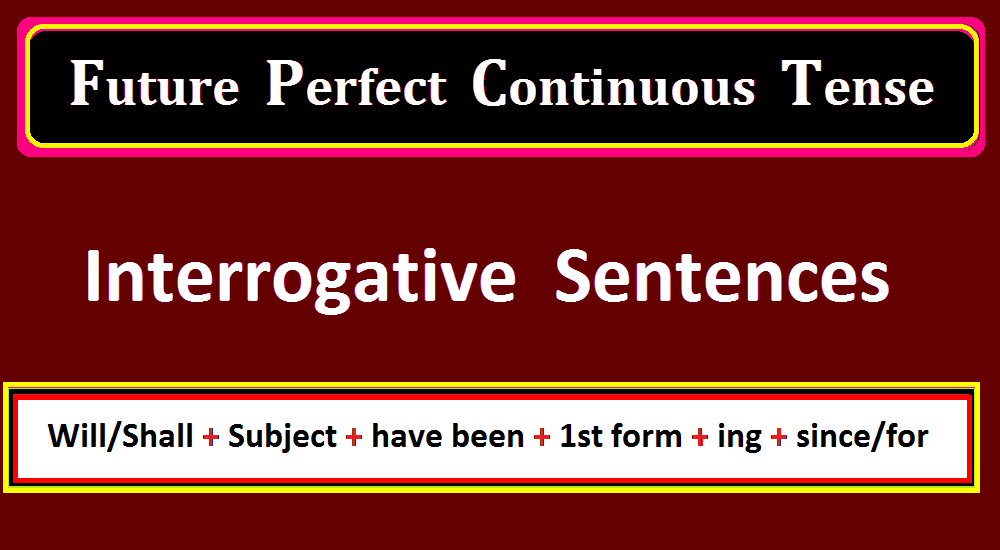
The future perfect continuous tense formation of an interrogative sentence is given.
Interrogative Formula of Future Perfect Continuous Tense:
The future perfect continuous tense interrogative formula is as follows.
(Helping Verb) Will/Shall + Subject + have + been + 1st form of verb + ing + Object + since/for
In the formation of interrogative sentences, understanding the interrogative formula for the future perfect progressive can help you in creating correct sentences.
Note Points:
There are some important points to form an interrogative sentence in the future perfect continuous tense;
- In this tense, you simply move “will” to the beginning of the sentence as question.
- In interrogative sentences, the auxiliary verbs (shall, will) come before the subject to show the interrogative sentence.
- A question mark (?) is placed at the end of a sentence to display the interrogative sentence in the future perfect progressive.
- If interrogative words (what, where, who, how, etc.) happen in sentences, they are used at the beginning of the sentences before the auxiliary verb (will/shall).
Interrogative Sentences Examples of Future Perfect Continuous Tense:
Here are some examples of exercises for interrogative sentences in the future perfect continuous tense;
- Shall I have been waiting for you for two days?
(Helping Verb: Shall, Subject: I, Add: have been, Main verb: wait, Add: ing, Object: for you, Period of time: for two days)
- Will you have been watching the match since 4 O, clock?
(Helping Verb: Will, Subject: you, Add: have been, Main verb: watch, Add: ing, Object: the match, Point of time: since 4 O, clock)
- Will they have been sleeping since noon?
(Helping Verb: Will, Subject: they, Add: have been, Main verb: sleep, Add: ing, Point of time: since noon)
- Will it have been raining cats and dogs since morning?
(Helping Verb: will, Subject: it, Add: have been, Main verb: rain, Add: ing, Object: cats and dogs, Point of time: since morning)
- Shall we have been living in this house since 1990?
(Helping Verb: Shall, Subject: we, Add: have been, Main verb: live, Add: ing, Object: in this house, Point of time: since 1990)
- Will the boys have been making a noise for an hour?
(Helping Verb: Will, Subject: the boys, Add: have been, Main verb: make, Add: ing, Object: a noise, Period of time: for an hour)
- Will she have been washing the clothes for two hours?
(Helping Verb: Will, Subject: she, Add: have been, Main verb: wash, Add: ing, Object: the clothes, Period of time: for two hours)
- Shall I have been studying in this collage for three years?
(Helping Verb: Shall, Subject: I, Add: have been, Main verb: study, Add: ing, Object: in this collage, Period of time: for three years)
- Will the doctor have been treating the patient since night?
(Helping Verb: Will, Subject: the doctor, Add: have been, Main verb: treat, Add: ing, Object: the patient, Point of time: since night)
- Will the child have been weeping since evening?
(Helping Verb: Will, Subject: the child, Add: have been, Main verb: weep, Add: ing, Point of time: since evening)
- Will they have been working hard for four days?
(Helping Verb: Will, Subject: they, Add: have been, Main verb: work, Add: ing, Object: hard, Period of time: for four days)
- Shall I have been learning this poem for two hours?
(Helping Verb: Shall, Subject: I, Add: have been, Main verb: learn, Add: ing, Object: this poem, Period of time: for two hours)
- Will it have been snowing on mountains since morning?
(Helping Verb: Will, Subject: it, Add: have been, Main verb: snow, Add: ing, Object: on mountains, Point of time: since morning)
- Will the sweepers have been cleaning the streets since morning?
(Helping Verb: Will, Subject: the sweepers, Add: have been, Main verb: clean, Add: ing, Object: the streets, Point of time: since morning)
- Will he have been taking exercise since morning?
(Helping Verb: Will, Subject: He, Add: have been, Main verb: take, Add: ing, Object: exercise, Point of time: since morning)
- Why will the baby have been crying since evening?
(Interrogative: Why, Helping Verb: will, Subject: the baby, Add: have been, Main verb: cry, Add: ing, Point of time: since evening)
These interrogative sentences express statements of inquiry about actions that will be happening from a certain time to a future point.
3. Negative Sentence Structure of Future Perfect Continuous Tense
Future Perfect Continuous Tense Negative sentences are used to show that an action will not be happening from a certain point in the future for a certain period of time. These sentences negate the idea of ongoing action in the future.
These sentences are formed by inserting (“not”) between “will” and “have,” followed by the past participle of the main verb.
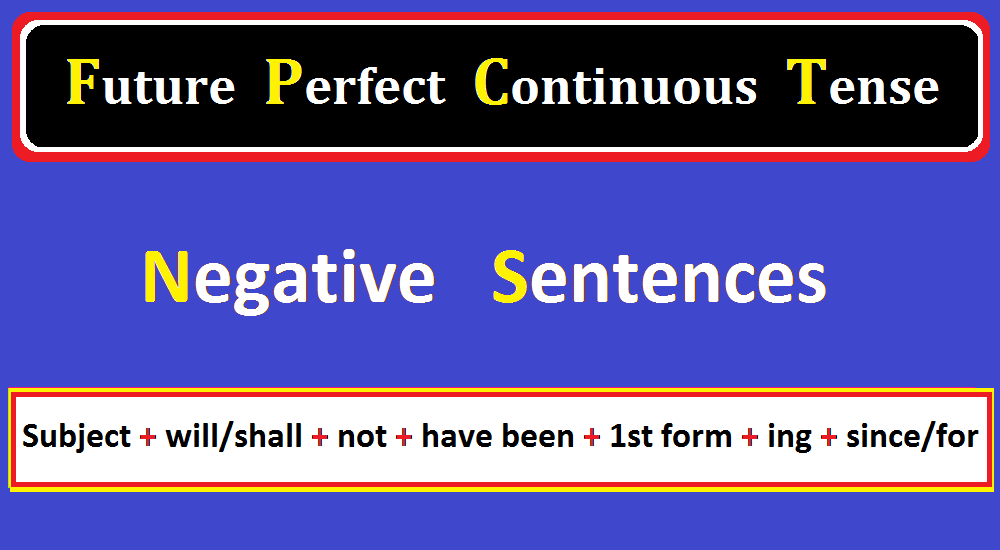
The formation of future perfect continuous tense for a negative sentence is given.
Negative Formula of Future Perfect Continuous Tense:
The future perfect continuous tense negative formula is the following;
Subject + (H.V) will/shall + not + have + been + 1st form of verb + ing + Object + since/for
Understanding the negative formula of future perfect progressive tense will help you create acceptable negative sentences.
Note Points:
There are some important points to make a negative sentence in future perfect continuous tense;
- The word “not” is added between the auxiliary verb (will/shall) and have been to show a negative sentence.
- “1st form of the verb” is used in negative such as affirmative and interrogative sentences in the future perfect progressive.
- A full stop (.) is placed at the end of a sentence such as a positive sentence in the future perfect progressive tense.
Negative Sentences Examples of Future Perfect Continuous Tense:
Here are some examples of exercises for negative sentences in the future perfect continuous tense;
- I shall not have been waiting for you for two days.
(Subject: I, Helping Verb: shall, Negative: not, Add: have been, Main verb: wait, Add: ing, Object: for you, Period of time: for two days)
- You will not have been watching the match since 4 O, clock.
(Subject: You, Helping Verb: will, Negative: not, Add: have been, Main verb: watch, Add: ing, Object: the match, Point of time: since 4 O, clock)
- They will not have been sleeping since noon.
(Subject: They, Helping Verb: will, Negative: not, Add: have been, Main verb: sleep, Add: ing, Point of time: since noon)
- It will not have been raining cats and dogs since morning.
(Subject: It, Helping Verb: will, Negative: not, Add: have been, Main verb: rain, Add: ing, Object: cats and dogs, Point of time: since morning)
- We shall not have been living in this house since 1990.
(Subject: We, Helping Verb: shall, Negative: not, Add: have been, Main verb: live, Add: ing, Object: in this house, Point of time: since 1990)
- The boys will not have been making a noise for an hour.
(Subject: The boys, Helping Verb: will, Negative: not, Add: have been, Main verb: make, Add: ing, Object: a noise, Period of time: for an hour)
- She will not have been washing the clothes for two hours.
(Subject: She, Helping Verb: will, Negative: not, Add: have been, Main verb: wash, Add: ing, Object: the clothes, Period of time: for two hours)
- I shall not have been studying in this collage for three years.
(Subject: I, Helping Verb: shall, Negative: not, Add: have been, Main verb: study, Add: ing, Object: in this collage, Period of time: for three years)
- The doctor will not have been treating the patient since night.
(Subject: The doctor, Helping Verb: will, Negative: not, Add: have been, Main verb: treat, Add: ing, Object: the patient, Point of time: since night)
- The child will not have been weeping since evening.
(Subject: The child, Helping Verb: will, Negative: not, Add: have been, Main verb: weep, Add: ing, Point of time: since evening)
- They will not have been working hard for four days.
(Subject: They, Helping Verb: will, Negative: not, Add: have been, Main verb: work, Add: ing, Object: hard, Period of time: for four days)
- I shall not have been learning this poem for two hours.
(Subject: I, Helping Verb: shall, Negative: not, Add: have been, Main verb: learn, Add: ing, Object: this poem, Period of time: for two hours)
- It will not have been snowing on mountains since morning.
(Subject: It, Helping Verb: will, Negative: not, Add: have been, Main verb: snow, Add: ing, Object: on mountains, Point of time: since morning)
- The sweepers will not have been cleaning the streets since morning.
(Subject: The sweepers, Helping Verb: will, Negative: not, Add: have been, Main verb: clean, Add: ing, Object: the streets, Point of time: since morning)
- He will not have been taking exercise since morning.
(Subject: He, Helping Verb: will, Negative: not, Add: have been, Main verb: take, Add: ing, Object: exercise, Point of time: since morning)
These negative sentences focus on the fact that the continuous action will not continue for the expected period of time in the future.
Conclusion:
When you want to talk about the duration of an activity, it is important to understand the structure of the future perfect continuous tense. In English grammar, it can be used in positive, negative, and interrogative sentences to express time in future.
